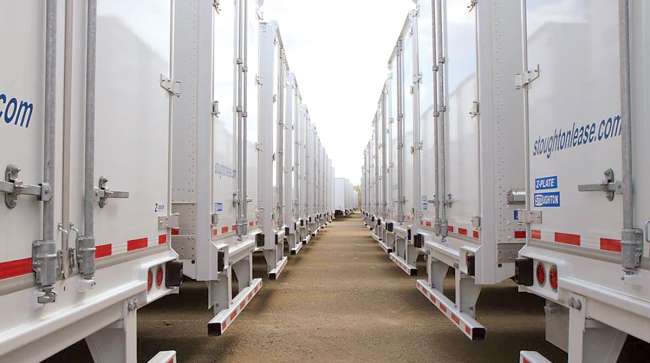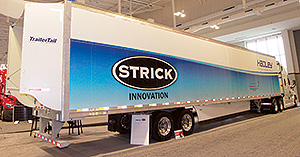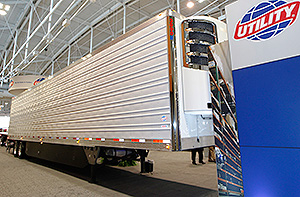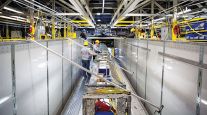April Trailer Orders Slide Amid Scarce Production Slots

U.S. net orders for trailers in April failed to hit 15,000, ACT Research reported, as conditions that sent orders plummeting in March remained in place — few production slots are open after the spree of record ordering in 2018.
Orders hit 14,702, down 37% compared with 23,332 a year earlier, according to ACT. A record 422,351 orders were placed in 2018.
The increase in April came in the form of cancellations.
New US trailer orders of 18.6k were up 4% m/m , but -23% compared to April 2018. Cancels pulled net orders into the red m/m. #Trailers #Transportation https://t.co/s5hS2H1aDa pic.twitter.com/56Lt4zlL8H
— ACT Research (@actresearch) May 23, 2019
U.S. net orders for trailers in April failed to hit 15,000, ACT Research reported, as conditions that sent orders plummeting in March remained in place — few production slots are open after the spree of record ordering in 2018.
Orders hit 14,702, down 37% compared with 23,332 a year earlier, according to ACT. A record 422,351 orders were placed in 2018.
The increase in April came in the form of cancellations.
“We showed 3,900 cancellations. As a percentage of backlog, that was 1.8%. And almost double what it was in March, when they were 1%,” said Frank Maly, director of commercial vehicle transportation analysis for ACT. “There is a lot of churn in the backlog.”
Maly said, “For perspective, we’ve had elevated cancels for the last five months. Cancels for January through April are now over 90% of the cancels posted for all of 2018.”
One possibility is that fleets may have placed orders at more than one trailer maker, he said, “and will now be moving forward with whoever had the best delivery timing.”
Maly also suggested fleet specs changed enough to warrant a reorder rather than significant engineering-change requests.
“Perhaps some fleets are actually reassessing their needs and changing their commitments,” he said.
Wabash National Corp. estimated order books across the industry would open up in June for 2020.
“That would be my best estimate, and Wabash will be in and around that time period one way or another,” Chief Financial Officer Jeff Taylor said during an earnings call.
FTR pegged April’s net orders at 14,800.
“It was kind of a mixed month. Some positives, some negatives,” said Don Ake, FTR’s vice president of commercial vehicles.
Production still was strong, and the backlog came in just over 200,000, which Ake called huge.
At the same time, flatbed orders have been weak over the past three months, he said.
“That is something I am watching because flatbeds are tied to manufacturing and the industrial economy,” Ake said.
Orders for refrigerated vans, too, were extremely low. Not many orders came in, and a lot were canceled, Ake said.

Strick trailer at an industry show by John Sommers II for Transport Topics.
“The only pent-up demand we are seeing is from customers who are being awarded spot business or are taking existing business from other customers,” Strick Trailers President Steve Burns said.
Most of Strick’s customers have placed orders for 2019, he said.
“While the supply base is very strained, our procurement team has done a stellar job in choosing the most reliable suppliers,” Burns said. “And the supplier base we have chosen is the best I’ve experienced in 40 years. We narrowed our focus on domestic suppliers that have proven performance records.”
At Stoughton Trailers, the number of red-tag trailers has held steady for the past few months, said David Giesen, vice president of sales.
“We would like it to be zero but are still seeing shortages that affect final completions — electrical components, suspension, a wide variety of items,” he said.
Giesen added there are a few components that have a limited choice of suppliers in North America, “and if they get further demand pressure then the price and availability could be impacted.”
To keep pace with demand, Stoughton has increased its base pay scale and most recently enhanced the benefits package.
“I cannot give specific details,” Giesen said. “All of this in the effort to attract and retain workers.”

Utility trailer at an industry show by John Sommers II for Transport Topics.
At the same time, Utility Trailer Manufacturing Co. has been unable to keep up with demand this year for dry vans and more complicated refrigerated units, Senior Vice President of Sales Craig Bennett said.
“And so some of that will spill over into next year unless a customer cannot wait for us,” he said. “I think the frenzy of demand that we experienced at the start of the year has moderated with the freight cycles.
“We are still waiting on some vendors to firm up 2020 costs, and of course the new Trump tariffs remain undetermined, and/or rising on some items.”
One financial analyst told Bloomberg News the trade talks are going to go on for months, quarters, years, maybe even decades.
“You don’t take 20 years of fairly free trade and try to reverse it or change it overnight,” said Gibson Smith, chief investment officer for Smith Capital Investors. “It’s going to take a long period of negotiating. There will be some wins and some losses on both sides.
“In the end, the market’s going to have to adapt to the new pricing mechanism that’s associated with these trade negotiations.”
Bennett said, “I believe Mr. Trump needs to do what he needs to do with China. It’s about time. Short-term pain for long-term gain for us all, hopefully.”
“We showed 3,900 cancellations. As a percentage of backlog, that was 1.8%. And almost double what it was in March, when they were 1%,” said Frank Maly, director of commercial vehicle transportation analysis for ACT. “There is a lot of churn in the backlog.”
Maly said, “For perspective, we’ve had elevated cancels for the last five months. Cancels for January through April are now over 90% of the cancels posted for all of 2018.”
One possibility is that fleets may have placed orders at more than one trailer maker, he said, “and will now be moving forward with whoever had the best delivery timing.”
Maly also suggested fleet specs changed enough to warrant a reorder rather than significant engineering-change requests.
“Perhaps some fleets are actually reassessing their needs and changing their commitments,” he said.
Wabash National Corp. estimated order books across the industry would open up in June for 2020.
“That would be my best estimate, and Wabash will be in and around that time period one way or another,” Chief Financial Officer Jeff Taylor said during an earnings call.
FTR pegged April’s net orders at 14,800.
“It was kind of a mixed month. Some positives, some negatives,” said Don Ake, FTR’s vice president of commercial vehicles.
Production still was strong, and the backlog came in just over 200,000, which Ake called huge.
At the same time, flatbed orders have been weak over the past three months, he said.
“That is something I am watching because flatbeds are tied to manufacturing and the industrial economy,” Ake said.
Orders for refrigerated vans, too, were extremely low. Not many orders came in, and a lot were canceled, Ake said.
“The only pent-up demand we are seeing is from customers who are being awarded spot business or are taking existing business from other customers,” Strick Trailers President Steve Burns said.
Most of Strick’s customers have placed orders for 2019, he said.
“While the supply base is very strained, our procurement team has done a stellar job in choosing the most reliable suppliers,” Burns said. “And the supplier base we have chosen is the best I’ve experienced in 40 years. We narrowed our focus on domestic suppliers that have proven performance records.”
At Stoughton Trailers, the number of red-tag trailers has held steady for the past few months, said David Giesen, vice president of sales.
“We would like it to be zero but are still seeing shortages that affect final completions — electrical components, suspension, a wide variety of items,” he said.
Giesen added there are a few components that have a limited choice of suppliers in North America, “and if they get further demand pressure then the price and availability could be impacted.”
To keep pace with demand, Stoughton has increased its base pay scale and most recently enhanced the benefits package.
“I cannot give specific details,” Giesen said. “All of this in the effort to attract and retain workers.”
At the same time, Utility Trailer Manufacturing Co. has been unable to keep up with demand this year for dry vans and more complicated refrigerated units, Senior Vice President of Sales Craig Bennett said.
“And so some of that will spill over into next year unless a customer cannot wait for us,” he said. “I think the frenzy of demand that we experienced at the start of the year has moderated with the freight cycles.
“We are still waiting on some vendors to firm up 2020 costs, and of course the new Trump tariffs remain undetermined, and/or rising on some items.”
One financial analyst told Bloomberg News the trade talks are going to go on for months, quarters, years, maybe even decades.
“You don’t take 20 years of fairly free trade and try to reverse it or change it overnight,” said Gibson Smith, chief investment officer for Smith Capital Investors. “It’s going to take a long period of negotiating. There will be some wins and some losses on both sides.
“In the end, the market’s going to have to adapt to the new pricing mechanism that’s associated with these trade negotiations.”
Bennett said, “I believe Mr. Trump needs to do what he needs to do with China. It’s about time. Short-term pain for long-term gain for us all, hopefully.”




